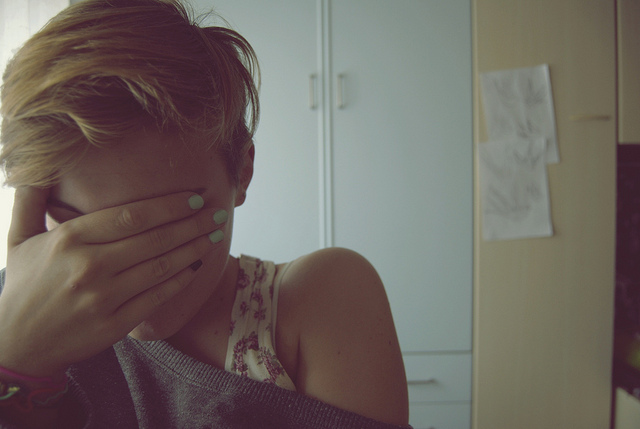I’m a grown-up woman with kids, a profession and a life filled with terrific friends, creative pursuits and other good things.
And at even the faintest suggestion of confrontation or conflict, I clunk into a state of blind panic: heart pounding, head buzzing, can’t think, leg and butt muscles tight and ready to spring into action. I spend at least the next two days feeling like absolute sh*t and trying to calm myself down.
So I’ve worked on it: counseling, EMDR, self-help books, yoga classes, weekend workshops and counsel from wise friends. I’ve taken little baby risks and stands and drawn wobbly boundaries. I’ve pushed myself to start tough conversations and to stay in them longer. I’ve tried to recognize and sit with the anxiety I feel.
And I thought that if I saw the wound, named it, understood it and practiced not letting it run my life—if I did my work––I would become a person who does not panic in the face of conflict. I could overcome that tendency via the magic of intelligent self-nurturing.
I was wrong.
I’ve gotten better at choosing what to do despite the anxiety, but damn it, I still feel like I’m about to jump out of a plane roughly twice a day.
I can’t freakin’ shake this thing.
It feels like part of my makeup. It feels…cellular.
Is it?
It could be.
I read some great stuff recently about something called epigenetics, which looks at the ways in which our genetic material expresses itself. I’ve been under the impression that our emotional and psychological lives are much more about nurture than nature: that we have a lot of control over how we feel and react to our worlds. Epigenetic research suggests otherwise.
In one study, researchers selected rats that were “good mothers” (for example, they groomed and nursed their young often) and “bad mothers” (“don’t bother me, rat baby, I need my space”). Predictably, the offspring mothered badly were much less able to handle stress. Their fight-or-flight machinery went haywire. The ones mothered well? They were chill. Their bodies didn’t go into panic mode nearly as readily. Well, duh. In the old dichotomy of nature vs. nurture, it would seem that nurture had won the day.
So the scientists then did another experiment where they switched the litters. Good mom’s babies were foisted on the bad moms, and vice versa. The result? The babies born to the bad moms still grew up to be nervous wrecks, despite having had better mothering. Many other studies performed in animals and human beings back this notion: that trauma, neglect, anxiety or depression impact us at the nature level in ways that no nurturance can overcome.
In other words, stress, anxiety, or trauma change DNA in a way that can be passed down, and that directly impacts offspring’s tendencies in those areas.
Folks have long said that behavior disorders like anxiety and depression have a genetic component. This is different, though, because changes in genes have long been thought to happen only very gradually, over hundreds or thousands or millions of years. This is something that can happen within a single generation.
Both my parents are Jewish, and I come from a long line of Eastern European Jewish people. Pogroms in Russia killed between 50,000 and 250,000 Jews between 1821 and 1922, leading to mass emigration of about two million Jews from that part of the world during that time (that’s when my people came to the US).
Two-thirds of the nine million Jews in Europe were exterminated during the Holocaust. I’d say that would be anxiety-producing for my grandparents, even if they were safely in the U.S. by 1941. My mother remembers having dreams about tanks invading their New Jersey city when she was a very young child.
There’s that stereotype of Jewish anxiety: that restless search for the next possible threat that has been fodder for many an ethno-religious joke and Woody Allen movie. Without Jewish anxiety, Seinfeld wouldn’t be very funny. As a people, we keep scanning the horizon for danger, and naming it as much as we can, because we know that the thing that will come in and really harm us is the thing we won’t see coming.
So. This anxiety I’ve been fighting to get rid of? Maybe it’s a permanent part of who I am.
It might be my realest connection to my ancestry. I can feel it like a whisper-thin thread connecting me to my mother, my grandmother and all the people from whom I am descended. This anxiety is my own ancestors looking out for me, sending messages to me through the cells I am built from.
They are telling me: If you argue and make it so others don’t like you, they might not care what happens to you. You’re safer agreeing and getting along. Avoid the tsuris and the mishegoss of all this argument and love, love, love. That’s the safest place for you to be.
Maybe I’ll always be swimming upstream against anxiety and panic. So be it.
As I accept that some aspects of myself cannot be improved through even the most potent self-improvement mumbo-jumbo (and really, that’s kind of a load off, not to think I could change this if only I found the right methodology), I can accept it about others, too.
I’m lowering my standards for everyone, because if I can’t change this, and I’m going to let that panicky freak flag fly, I’m going to admire the freak flags of others (flown for an unexplainable depression, maybe, or seemingly misplaced anger, or those of my sisters and brothers in irrational panic). I’ll try to accept others’ moods and angst at face value. I won’t give them advice about how they can Kick Their Depression With Positive Thinking or how they can Subdue Their Panic With Pranayama.
I’ll operate under the assumption that these immutable physiologic and inherited truths of their physiology are deeply rooted messages from their ancestors that might never be pulled completely free.
Love elephant and want to go steady?
Sign up for our (curated) daily and weekly newsletters!
Author: Melissa Lowenstein
Editor: Catherine Monkman
Photo: Alessandra/Flickr



Read 5 comments and reply